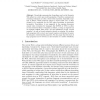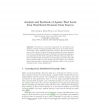12 search results - page 1 / 3 » Do we need the closed world assumption in knowledge represen... |
KRDB
1994
13 years 6 months ago
1994
ESWS
2006
Springer
13 years 9 months ago
2006
Springer
Abstract. Semantic Web Services were developed with the goal of automating the integration of business processes on the Web. The main idea is to express the functionality of the se...
ICTAI
2007
IEEE
13 years 11 months ago
2007
IEEE
We review a method of generating logical rules, or axioms, from empirical data. This method, using closed set properties of formal concept analysis, has been previously described ...
ESWS
2006
Springer
13 years 9 months ago
2006
Springer
Knowledge representation formalisms used on the Semantic Web adhere to a strict open world assumption. Therefore, nonmonotonic reasoning techniques are often viewed with scepticism...
NEUROSCIENCE
2001
Springer
13 years 9 months ago
2001
Springer
We propose a theoretical framework for specification and analysis of a class of learning problems that arise in open-ended environments that contain multiple, distributed, dynamic...


